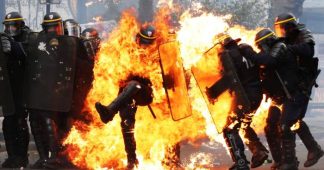To travel abroad as an American in 2018 is to serve as a baffled explicator of scandal. No outsider quite understands what we are living through; we don’t even understand what we are living through, and trying to describe even the simplest of the ludicrously plausible conspiracy theories that dominate our current politics is not an easy business. At the moment, I am in France, a country that I have been visiting regularly since the George W. Bush era, when the dominant feeling, as a blue-aligned American, was shame at our President’s stupidity and headlong imperialist ambitions. The Obama years brought a resurgence of pride, the balm of sanity. Now I find myself met with something like pity, tinged with curiosity and commiseration. The United States poses a threat to the rest of the world, as usual. The commiseration comes from the fact that we now also pose a threat to ourselves.
So it has been an unexpected point of solidarity to find that France is in the midst of an opaque political scandal of its own. L’Affaire Benalla began just after the World Cup ended, though its central event took place on May 1st, traditionally a day of labor protests around France. This year’s demonstrations, fuelled by frustration with President Emmanuel Macron and his pro-business policies, were especially dramatic. More than a thousand members of the far-left Black Bloc movement came to the demonstrations in Paris dressed in dark hoodies and balaclavas. Windows were smashed; cars were torched. Footage circulated on social media showing riot police spraying tear gas and bashing protesters with truncheons. One video, taken in Paris’s Fifth Arrondissement after protesters had already begun to disperse, shows a man in a what appears to be police riot gear grabbing a young woman by the back of her neck and rushing her across the street. The camera moves to show a group of policemen descending on a young man in jeans and sneakers, pummelling him to the ground. He has managed to sit up on his knees, surrounded and subdued, when the first officer suddenly returns, seizes him from behind by the throat, drags him to his feet, and begins to punch him in the head, before throwing him down and stomping on his stomach. Suddenly, the officer seems to catch himself, pulling away from his doubled-over victim, as if unsure of what to do next. “Get a good look at him!” the video-maker shouts, as the camera swivels to capture the officer’s face before he walks away.
On July 18th, tipped off by an anonymous source, Le Monde revealed that the brutalizer in the video was not, in fact, a police officer at all but, rather, Alexandre Benalla, a twenty-six-year-old security aide to Macron. Benalla had asked to observe the police operations on May 1st, which does not explain how, or why, he had obtained a walkie-talkie, a police helmet, and an armband. (Impersonating a French officer is illegal.) Though the Elysée Palace had swiftly learned of the video, it emerged that Benalla had been suspended from work for only two weeks, and hadn’t been taken off Macron’s security detail. The Elysée had also failed to warn the judiciary of Benalla’s suspension in a timely manner, which led to rumblings about a coverup. Just what was the nature of Benalla’s relationship to the President, anyway? Why did he have, as was discovered, a diplomatic passport and a gun permit? Photos began to surface showing the President and his aide sharing what seemed, to some, an unusual intimacy: Macron and Benalla grinning together at the Salon de l’Agriculture; Macron and Benalla riding bikes in polo shirts the color of rosé and lemon sherbet, respectively.
Read more at https://www.newyorker.com/culture/culture-desk/will-scandal-sink-emmanuel-macron











